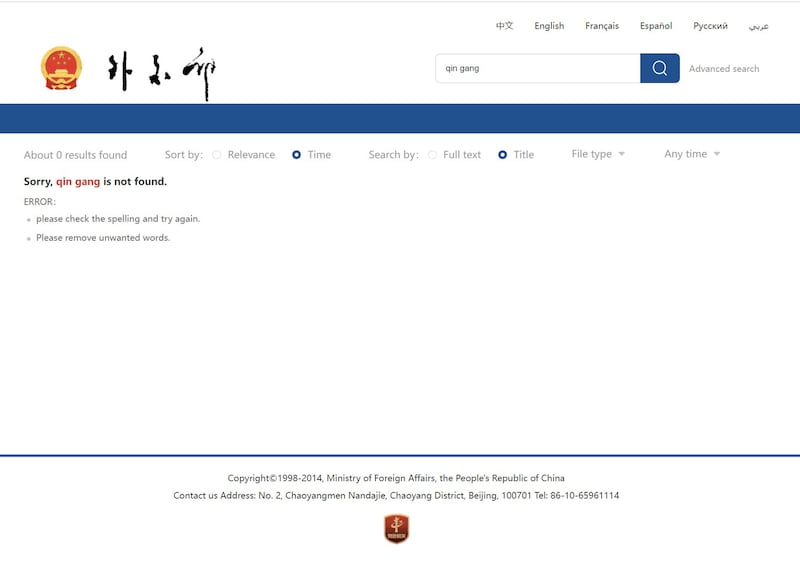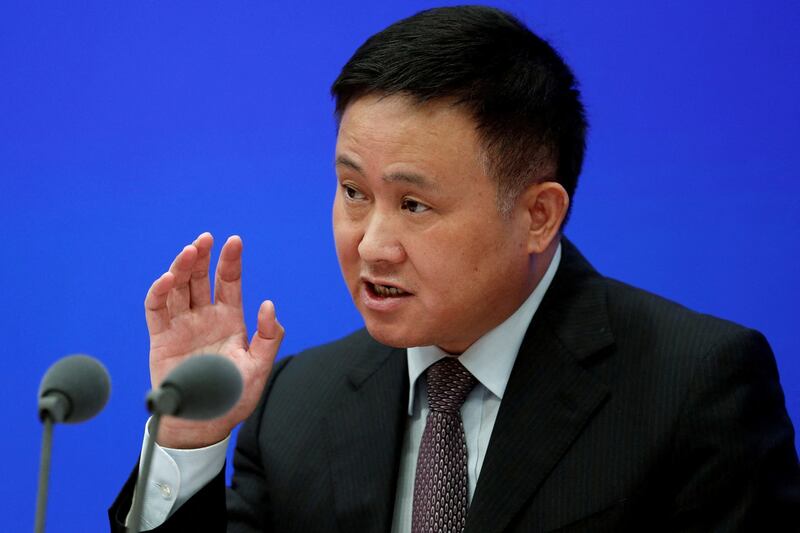UPDATED AT 12:29 PM ET on 07-27-2023.
No sooner had former Chinese foreign minister Qin Gang been replaced by his predecessor Wang Yi on Tuesday, after a mystery disappearance of a month, than he began to be erased, in a move evocative of the Mao Zedong era.
During the Mao era, senior officials who fell out of favor and later purged were frequently excised from the annals of party missives – and party history.
The same fate appears to have befallen Qin Gang, leaving the world to scratch its head and wonder why China, as opaque as ever, is not telling.
At the very least the erasures undermine the official explanation in weeks past that Qin’s absence was due to ill health.
Almost as soon as foreign policy chief Wang Yi was announced to be taking over Qin’s position – in a move many China watchers consider to be transitional – Qin, who had been catapulted into the role of foreign minister as a Xi Jinping favorite and had only served for seven months – was scrubbed from the foreign ministry’s web pages.
Even foreign ministry news releases have been removed – replaced with a message that reads, “The page you are visiting does not exist or has been deleted.”

The page for the foreign minister on the Ministry of Foreign Affairs website continues to be blank, in what Han Yang, who formerly worked for China's foreign ministry and is now a political commentator in Australia, said on X (formerly Twitter) is "possibly because Wang Yi has yet to be sworn in."
All references to Qin and his activities as foreign minister have been removed from the Ministry of Foreign Affairs website, but he continues to be listed elsewhere as a state councilor and references to his tenure as ambassador to the U.S. continue to exist.
Some analysts think that this is a sign that he still has some measure of protection; others say it’s likely Qin is being purged but the process is incomplete, and he may forfeit his state councilor role in future too.
Qin is also still listed as a member of the Communist Party’s elite Central Committee.
“The relevant information on appointments and dismissals has been released in a timely manner from the Chinese side,” Chinese Foreign Ministry spokesperson Mao Ning said at a briefing on Thursday, according to a Reuters transcript. “We are always opposed to malicious hype surrounding this matter.”
Her comment, however, was not included in the official transcript of the briefing on the ministry's website.
But Yang noted, "Let me remind everyone that in Bo Xilai's case [President Xi Jinping's high-flying, populist rival who fell from grace after his wife poisoned a British businessman], he was initially removed from Chongqing party post in exactly the same manner, a short statement without giving reasons, while maintaining his Politburo position. 4 weeks later the announcement came for his investigation."
“People from the outside are totally in the dark and the episode illustrates that Chinese politics is becoming increasingly unpredictable and volatile, though under a calm surface,” Ho-fung Hung, an expert in Chinese politics at Johns Hopkins University, told AFP.
Meanwhile, in related news, and a reminder of the risks of China’s high-wire politics, the former Communist Party chief of Hangzhou – home to Jack Ma’s Alibaba – was given life behind bars in the form of a deferred death sentence for corruption.
Zhou Jiangyong was convicted of accepting CNY182 million (U.S.$25 million) in bribes and has been deprived of his political rights and had all of his assets confiscated.
One winner
Amid a week of political hijinks and skullduggery, one political player has made his way to the top as anticipated.
Pan Gongsheng, a Chinese Communist Party technocrat experienced in commercial banking and financial regulation, was appointed the governor of the People’s Bank of China. Pan holds a PhD in economics from China and received some training from Cambridge University and Harvard University.
The position of governor of the central bank is an important one in China’s financial system, but the governor’s powers are curtailed by the party compared to central bankers elsewhere. President Xi himself demands a role in all key economic decisions, for example.

Pan managed the world’s largest foreign exchange reserves for seven years – as Administrator of the State Administration of Foreign Exchange, managing China’s foreign reserves of around U.S.$3.2 trillion.
He’s also credited with arresting a slide in the value of the yuan in 2016.
He replaces Yi Gang, who had been PBOC governor since 2018, after replacing Zhou Xiaochuan, the PBOC’s longest serving governor, having served in the role for 15 years.
Pan has a PhD in economics from China’s Renmin University, was a visiting scholar at Cambridge and also studied at Harvard.
He was anticipated to be made governor ahead of Tuesday’s announcement and he will have his work cut out for him.
The value of China's currency has been sliding this year as the economy faces unprecedented headwinds in the form of youth unemployment and lackluster consumer and private sector confidence, leading to obvious concern emanating from Beijing that what is now a malaise could become something worse.
Edited by Mike Firn.
This story has been updated to include a comment from China's Foreign Ministry spokesperson.
